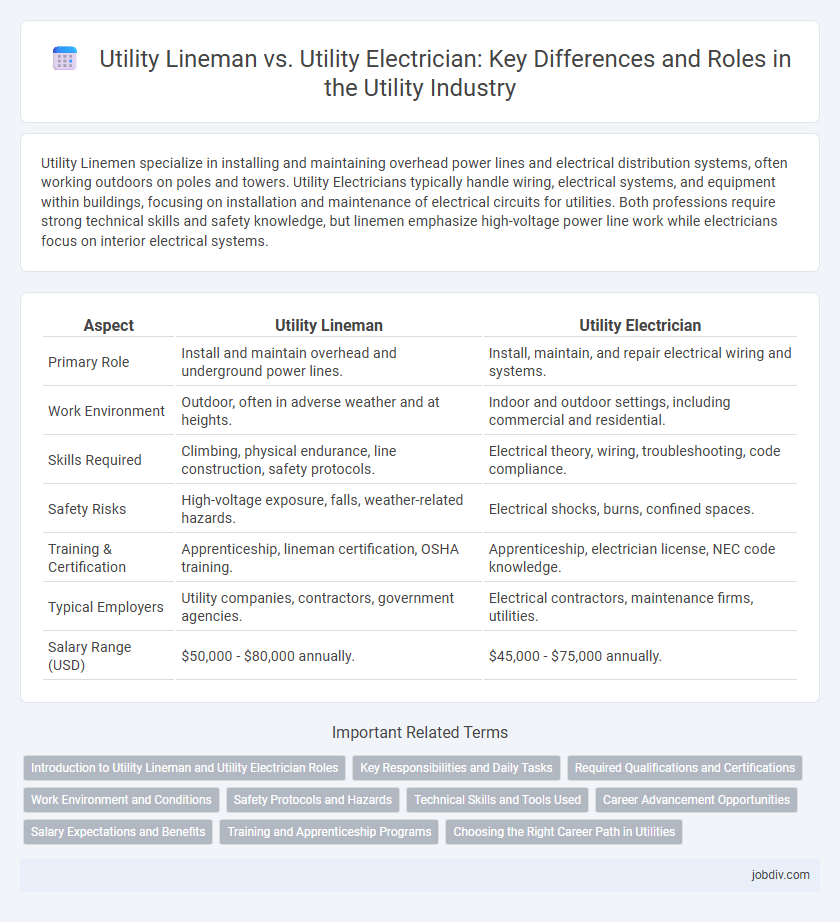Utility Linemen specialize in installing and maintaining overhead power lines and electrical distribution systems, often working outdoors on poles and towers. Utility Electricians typically handle wiring, electrical systems, and equipment within buildings, focusing on installation and maintenance of electrical circuits for utilities. Both professions require strong technical skills and safety knowledge, but linemen emphasize high-voltage power line work while electricians focus on interior electrical systems.
Table of Comparison
| Aspect | Utility Lineman | Utility Electrician |
|---|---|---|
| Primary Role | Install and maintain overhead and underground power lines. | Install, maintain, and repair electrical wiring and systems. |
| Work Environment | Outdoor, often in adverse weather and at heights. | Indoor and outdoor settings, including commercial and residential. |
| Skills Required | Climbing, physical endurance, line construction, safety protocols. | Electrical theory, wiring, troubleshooting, code compliance. |
| Safety Risks | High-voltage exposure, falls, weather-related hazards. | Electrical shocks, burns, confined spaces. |
| Training & Certification | Apprenticeship, lineman certification, OSHA training. | Apprenticeship, electrician license, NEC code knowledge. |
| Typical Employers | Utility companies, contractors, government agencies. | Electrical contractors, maintenance firms, utilities. |
| Salary Range (USD) | $50,000 - $80,000 annually. | $45,000 - $75,000 annually. |
Introduction to Utility Lineman and Utility Electrician Roles
Utility Linemen specialize in installing, maintaining, and repairing high-voltage power lines and electrical distribution systems, often working outdoors in various weather conditions and at significant heights. Utility Electricians focus on wiring, installing, and maintaining electrical systems within utility facilities, including substations and power plants, ensuring the safe and efficient operation of electrical equipment. Both roles are critical to maintaining the reliability of the electrical grid, with linemen addressing external infrastructure and electricians managing internal electrical components.
Key Responsibilities and Daily Tasks
Utility Linemen primarily handle the installation, maintenance, and repair of overhead and underground power lines, ensuring safe and reliable electricity distribution. Utility Electricians focus on wiring, troubleshooting, and maintaining electrical systems within substations, power plants, and commercial facilities to support electrical infrastructure. Both roles require adherence to safety protocols, but linemen often work at heights outdoors, while electricians typically operate inside controlled environments.
Required Qualifications and Certifications
Utility Linemen require a combination of vocational training and on-the-job apprenticeship programs, commonly needing certifications such as OSHA safety training, pole climbing, and CPR. Utility Electricians typically must hold a journeyman electrician license, which involves completing an accredited electrical apprenticeship and passing state licensing exams. Both professions demand stringent knowledge of electrical safety standards and continuous education to maintain certification compliance.
Work Environment and Conditions
Utility linemen often work outdoors in varying weather conditions, including extreme heat, cold, and storms, frequently at great heights on power poles or transmission towers. Utility electricians typically perform their duties in both indoor and outdoor settings, focusing on electrical systems within buildings or smaller-scale infrastructure, where working conditions are more controlled. Both professions require adherence to strict safety protocols due to exposure to high-voltage electricity and potential hazards.
Safety Protocols and Hazards
Utility linemen and utility electricians both adhere to strict safety protocols due to exposure to high-voltage electrical systems, but their hazard profiles differ significantly. Linemen working on overhead power lines face risks such as falls from heights, electric shock from live wires, and adverse weather conditions, necessitating specialized climbing gear, insulated gloves, and fall arrest systems. Utility electricians typically operate in controlled environments with risks including arc flashes, electrical burns, and confined space hazards, requiring comprehensive PPE like flame-resistant clothing, face shields, and lockout/tagout procedures.
Technical Skills and Tools Used
Utility Linemen specialize in installing and maintaining high-voltage power lines, using tools such as hot sticks, cable pullers, and bucket trucks to work safely at heights. Utility Electricians focus on wiring, troubleshooting, and repairing electrical systems within buildings, employing tools like multimeters, wire strippers, and conduit benders. Both require expertise in electrical systems but differ in the environments and specific technical skills related to overhead power distribution versus indoor electrical infrastructure.
Career Advancement Opportunities
Utility linemen typically advance into supervisory roles or specialized technical positions such as power line inspectors or safety trainers, leveraging extensive field experience. Utility electricians often progress toward electrical engineering, maintenance management, or project coordination roles, benefiting from a stronger emphasis on electrical system design and troubleshooting skills. Both career paths offer certifications and training programs that enhance promotion prospects and expertise in the utility industry.
Salary Expectations and Benefits
Utility linemen typically earn higher average salaries than utility electricians, with annual wages often ranging from $60,000 to $85,000 compared to electricians' $45,000 to $70,000. Linemen frequently receive extensive overtime pay and hazard pay due to the physically demanding and high-risk nature of their work, significantly boosting their total compensation. Benefits for both roles commonly include health insurance, retirement plans, and paid training, but linemen often have access to more comprehensive safety bonuses and union protections.
Training and Apprenticeship Programs
Utility linemen undergo rigorous apprenticeship programs typically lasting 3 to 4 years, emphasizing climbing, pole maintenance, and high-voltage power line installation and repair. Utility electricians receive specialized training focused on electrical wiring, systems troubleshooting, and compliance with electrical codes, often through technical schools followed by apprenticeships lasting 3 to 5 years. Both professions require comprehensive safety training and certification, but utility lineman programs prioritize outdoor power distribution skills, while utility electrician programs concentrate on building and industrial electrical systems.
Choosing the Right Career Path in Utilities
Utility linemen specialize in installing and maintaining overhead and underground power lines, requiring strong climbing skills and physical endurance, while utility electricians focus on wiring, electrical repairs, and system troubleshooting within facilities, emphasizing technical electrical knowledge. Choosing the right career path depends on your preference for working outdoors in high-risk environments as a lineman or indoors with complex electrical systems as an electrician. Both roles demand safety awareness and offer stable job prospects in the growing utility industry.
Utility Lineman vs Utility Electrician Infographic

 jobdiv.com
jobdiv.com